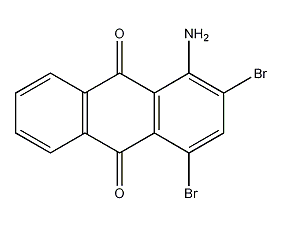
Structural formula
| Business number | 01S7 |
|---|---|
| Molecular formula | C14H7Br2NO2 |
| Molecular weight | 381.02 |
| label |
None yet |
Numbering system
CAS number:81-49-2
MDL number:MFCD00019155
EINECS number:201-354-0
RTECS number:None
BRN number:None
PubChem ID:None
Physical property data
1. Appearance: red powder
2. Density (g/mL, 25/4℃): Uncertain
3. Relative vapor density (g/mL, air =1): Uncertain
4. Melting point (ºC): 226
5. Boiling point (ºC, normal pressure): Uncertain
6. Boiling point (ºC, 5.2kPa): Uncertain
7. Refractive index: Uncertain
8. Flash point (ºC): Uncertain
9. Ratio Optical rotation (º): Uncertain
10. Autoignition point or ignition temperature (ºC): Uncertain
11. Vapor pressure (kPa, 25ºC): Uncertain
p>
12. Saturated vapor pressure (kPa, 60ºC): Uncertain
13. Heat of combustion (KJ/mol): Uncertain
14. Critical temperature (ºC ): Uncertain
15. Critical pressure (KPa): Uncertain
16. Log value of oil-water (octanol/water) partition coefficient: Uncertain
17. Explosion upper limit (%, V/V): Uncertain
18. Explosion lower limit (%, V/V): Uncertain
19. Solubility: Slight Dissolved in water.
Toxicological data
1. Teratogenicity
Salmonella: 333 ug/plate
Rat: 329 gm/kg/39W;
2. Neurotoxicity
Rabbit eye test: 500mg/24H;
3. Other multiple dose toxicity data
Rat caliber TDL0: 130500mg/kg/90D-C
Mouse caliber TDL0: 42075mg/kg/90D-C
Ecological data
None yet
Molecular structure data
1. Molar refractive index: 74.83
2. Molar volume (cm3/mol): 179.8
3. Isotonic specific volume (90.2K ): 541.7
4. Surface tension (dyne/cm): 82.4
5. Polarizability (10-24cm3): 29.66
Compute chemical data
1. Reference value for hydrophobic parameter calculation (XlogP): 4.1
2. Number of hydrogen bond donors: 1
3. Number of hydrogen bond acceptors: 3
4. Number of rotatable chemical bonds: 0
5. Number of tautomers: 3
6. Topological molecule polar surface area 60.2
7. Number of heavy atoms: 19
8. Surface charge: 0
9. Complexity: 414
10. Number of isotope atoms: 0
11. Determine the number of atomic stereocenters: 0
12. Uncertain number of atomic stereocenters: 0
13. Determined number of chemical bond stereocenters: 0
14. Uncertain number of chemical bond stereocenters: 0
15. Number of covalent bond units: 1
Properties and stability
None yet
Storage method
This product should be sealed and stored in a dry and dark place.
Synthesis method
First stir 1-aminoanthraquinone and water in a pot, grind them into colloids, then add them to the bromination pot, and add water to adjust the volume. Then add 30% hydrochloric acid and bromine, stir for 1 hour, and slowly add 10% sodium hypochlorite solution. Raise the temperature to 50°C in 2 hours, keep it warm for 2 hours, raise the temperature to 80°C within 3 hours, and keep the reaction until the end point (the measured melting point is above 220°C.). Add 10% sodium bisulfite solution, cool to below 50°C, filter, wash until neutral, and dry. When 50.17kg of 1-aminoanthraquinone and 48kg of bromine are added to each batch, 81.45kg of 1-amino-2,4-dibromoanthraquinone can be obtained.
Purpose
Intermediates for dyes and other organic chemical raw materials.

 微信扫一扫打赏
微信扫一扫打赏

